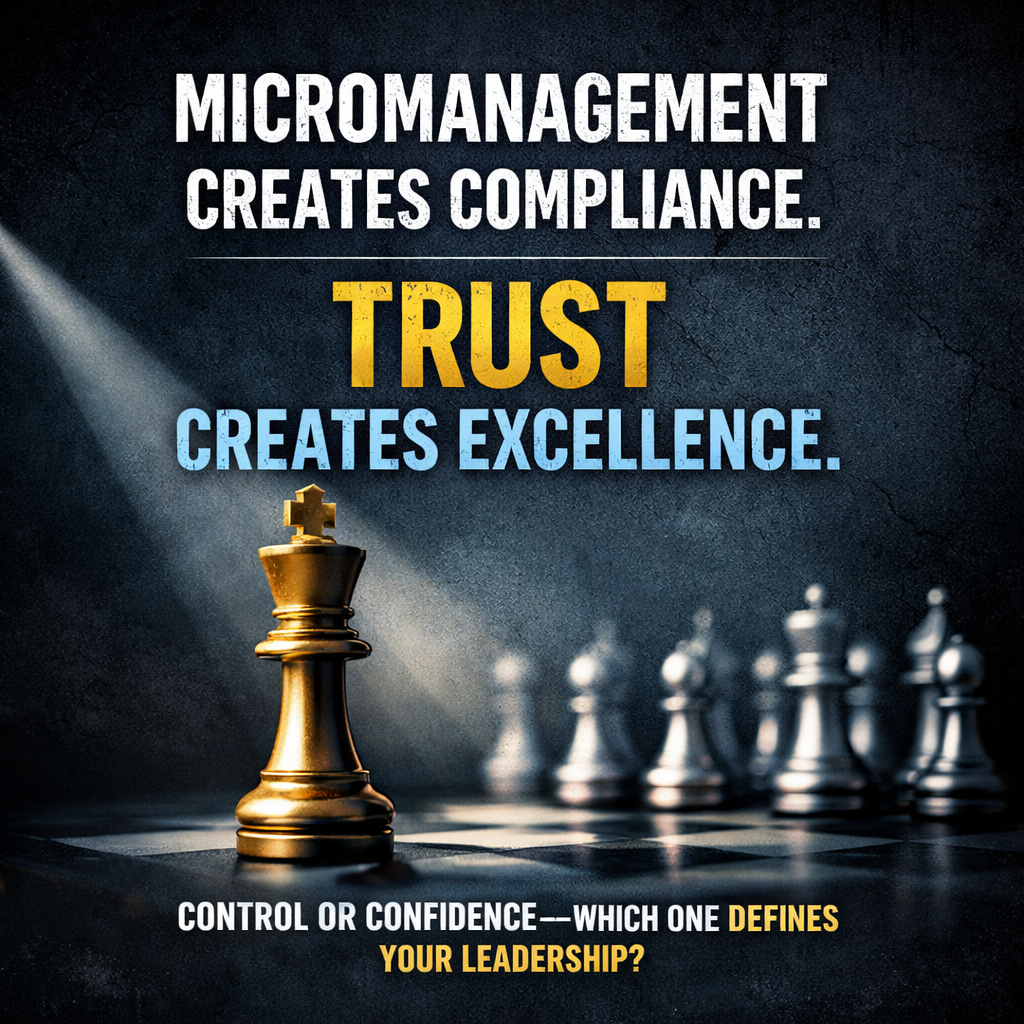How to Lead High Achievers at Work Without Micromanaging or Burning Them Out
High achievers can transform an organization. They move quickly, set ambitious goals, and push past obstacles that stop others in their tracks. When led well, they raise the standard for everyone around them. When led poorly, they become frustrated, disengaged, or quietly start looking for another opportunity.
Leading high achievers requires a different mindset than traditional management. It demands clarity, trust, and emotional steadiness more than control. Leaders who understand this difference build teams that perform at a high level for the long haul.
Understanding the High Achiever Mindset
I am a high achiever. If something needs to be done, I will work until it is finished. If I do not understand something, I will study it, ask experts, test ideas, and experiment until I figure it out. High achievers are wired this way. We are internally driven. We do not need constant reminders to perform; we need space to execute.
Many leaders misunderstand this internal drive. They assume oversight equals support. In reality, too much oversight slows momentum and erodes trust. High performers thrive when given a clear objective, a deadline, and the autonomy to deliver.
When Leadership Training Becomes Micromanagement
At one point in my career, I worked for a manager who loved leadership courses and books about leadership. He believed this made him an exceptional leader. To his credit, he did many things well. He was organized and built solid processes. Structure was not his weakness.
However, when it came to leading a high achiever, his feathers often got ruffled. He wanted to be included on every email, required permission before nearly every action, and closely monitored details that did not require his involvement. During performance reviews, he would often say, “I am helping you so you can lead people someday.”
The irony was difficult to ignore. I had already led a company, managed multiple teams, and carried significantly more experience in that field than he had. Leadership is a lifelong learning process, and I certainly do not know everything. Still, it felt comical to be told I was being prepared to lead someday by someone who had only a year or two of leadership experience in his life.
The broader organization struggled with his leadership style as well. People were kind and genuinely tried to support him. They encouraged him and attempted to build him up. Even in such a patient workforce, there were occasional flashes of frustration that slipped through. I found myself biting my tongue daily.
Why Micromanaging High Performers Backfires
As someone who is highly driven, I do not respond well to being told exactly how to do my job. Give me the outcome, clarify when it needs to be done, and release me to execute. I will complete the task and likely improve upon the original vision.
Micromanagement slows high achievers down. It introduces unnecessary friction and communicates a lack of trust. Nothing is more frustrating than being hired for expertise while simultaneously being treated as if you cannot be trusted to use it. The unspoken question becomes unavoidable: why hire me if you do not trust me to do the work?
For leaders researching how to manage high performers effectively, this is a critical lesson. High achievers do not resist accountability. They resist control that limits their capacity to produce results.
How to Lead High Achievers Effectively
Leading high achievers successfully begins with separating identity from output. High performers often tie their worth to results. Wise leaders reinforce value beyond performance metrics while still holding a high standard. Recognition should include strategic thinking, initiative, and team impact, not just raw output.
Clarity is far more powerful than control. High achievers perform best when expectations are clearly defined and success metrics are measurable. Once the target is established, autonomy becomes the fuel for innovation. Trust accelerates performance. Excessive oversight suffocates it.
Healthy leadership also requires emotional steadiness. Strong-willed employees will challenge ideas and move quickly. Conflict is not the enemy. Poorly managed conflict is. Calm leadership that redirects tension toward shared goals builds respect and cohesion across teams.
Preventing Burnout in High Achievers
Burnout prevention is another essential leadership skill. High achievers often push themselves beyond sustainable limits. They overcommit, hesitate to delegate, and rarely slow down. Leaders must model healthy boundaries and encourage long-term pacing. Celebrating strategic delegation and thoughtful execution sends a powerful message that sustainable excellence matters more than constant hustle.
Retention of top talent depends on this balance. High performance without health is temporary. Organizations that fail to protect their most driven employees eventually lose them.
Building Trust-Based Leadership
Trust sits at the center of effective leadership for high achievers. Trust says, “I hired you because you are capable.” It communicates confidence in judgment, experience, and execution. It replaces surveillance with partnership.
High achievers do not need constant correction. They need clear goals, meaningful challenges, and room to think. When leaders provide that environment, performance multiplies.
The most effective way to lead high achievers at work is surprisingly simple. Define the objective. Set the deadline. Establish guardrails. Then step aside and allow expertise to do what it was hired to do.
Micromanagement breeds frustration. Trust builds momentum. Leaders who understand this distinction unlock not only productivity but loyalty and long-term engagement.
“I Have Common Sense. Why Is Everyone Else Struggling?”
I recently posted a question on LinkedIn: “What is one of the most underrated professional skills?” Within minutes, my adult son texted me a screenshot of the post with a one-word reply: “Common sense.” He followed it with, “You should write about this.”
My son has always been more observant than most people. He learns quickly and notices patterns others often miss. Even as a toddler, he would grow frustrated with kids around him and occasionally with adults because he believed the answers to problems were obvious. He was not always correct, although more often than not he seemed to have a strong grasp of situations. His confidence came naturally, reinforced by curiosity and discipline at home. He developed habits that strengthened his ability to learn and succeed. He became a nationally competitive athlete, learned to work harder than many adults twice his age, and earned straight A’s throughout school.
When he was twelve, a university professor who specialized in DNA happened to visit our home. Within minutes, he and my son were deep in conversation about cells, DNA structures, and how biological systems function. The discussion lasted nearly an hour. I understood very little of it, yet my son was completely engaged. Afterward, the professor turned to my wife and me and said, “This kid has a better understanding of cells and DNA than most of my graduate students.” He was genuinely impressed and asked where our son had learned all of it. We had no idea. When I later asked my son, he shrugged and said, “Dad, that’s just stuff you learn in third grade.” In reality, most people do not learn that in third grade, and many never grasp it at that level.
That moment illustrates something important. Even though my son is exceptionally intelligent, it does not mean he possesses more “common sense” than others. It means he has had different experiences. He has been exposed to different information and developed certain ways of thinking earlier than many people. Exposure creates clarity, and clarity can feel like common sense to the person who has it.
This same dynamic plays out in the workplace every day. Many professionals sit in meetings thinking, “This is obvious.” Someone proposes a complicated solution to what feels like a simple issue. Someone asks a question that seems unnecessary. Someone misses what appears to be a clear pattern. Frustration creeps in quietly. You may pride yourself on being practical and decisive. You may genuinely see things others overlook.
What feels obvious, however, is often the product of background, training, and perspective. Experience shapes what the brain recognizes as simple. A seasoned operations manager sees inefficiencies immediately because of years of pattern recognition. A creative director spots messaging gaps because of repeated exposure to branding mistakes. A financial analyst notices risk variables others do not consider. Each person’s “common sense” is built from accumulated experiences rather than universal knowledge.
Problems arise when we mistake familiarity for universality. The thought “This is common sense” can subtly change tone and body language. A slight sigh, an impatient glance, or a dismissive word choice communicates more than intended. Accuracy alone does not build professional credibility. How others feel in your presence often determines whether they continue engaging with you.
Competence paired with irritation creates distance. Competence paired with humility creates influence. When people feel respected, they ask questions more freely. When they feel judged, they withdraw. Withdrawal then reinforces the belief that you are surrounded by incompetence, even when that is not true.
Another reality worth considering is that quick pattern recognition does not eliminate blind spots. My son, brilliant as he is, has been wrong many times. Intelligence changes where blind spots exist; it does not remove them entirely. Assuming clarity can sometimes prevent curiosity. Curiosity, however, is what keeps growth alive.
The most underrated professional skill may not simply be common sense. It may be the ability to recognize that your version of common sense is shaped by your path. Strong professionals assume intelligence in others. They seek context before drawing conclusions. They offer explanations without superiority and corrections without embarrassment. They remain open to the possibility that someone else sees a variable they missed.
Seeing patterns quickly is a strength. Using that strength to elevate the room rather than separate yourself from it is maturity. When clarity is combined with humility, it becomes leadership. Recognizing that experience shapes perception may be the most practical form of common sense of all.
If you often find yourself thinking, “Why doesn’t everyone see this?” pause for a moment and consider a different question: “What experiences led me to see this clearly, and what experiences might they have had that I have not?” That shift transforms frustration into perspective. Perspective, more than intelligence, is what builds lasting professional respect.
The Lifetime Warranty Trap: A Business Lesson in Sustainability and Integrity
“Lifetime warranty” is one of the most compelling phrases in marketing.
It signals confidence in the product. It communicates durability. It reassures customers that the company stands firmly behind what it sells. In crowded markets, that promise can be a powerful competitive differentiator.
However, the phrase also carries risk when expectations and intent begin to drift apart.
Consider the example of a customer who owns socks with a lifetime warranty. The socks are worn regularly for years—until they are thin, stretched, and eventually develop holes. At that point, the customer returns to the store and requests a new pair because the original pair “did not hold up.” Technically, the warranty allows replacement. From a sustainability perspective, the situation becomes more complex.
In another instance, a professional shared on LinkedIn how a retail store replaced a ten-year-old bag that had begun to peel after years of use. The store immediately provided a free replacement. The customer publicly praised the company’s exceptional service and loyalty to its brand promise.
Both stories generate positive impressions. Both highlight companies that honor their guarantees. Yet they also raise an important strategic question: at what point has a product simply delivered its full and reasonable lifespan?
The Tension Between Marketing and Sustainability
Most lifetime warranties are designed to protect against manufacturing defects or premature failure. They are not typically intended to provide perpetual replacement after normal wear and tear. A product that has served effectively for a decade has likely fulfilled its intended value proposition.
If every customer used products to the end of their natural lifespan and then claimed free replacements, the economics would quickly become unsustainable. Revenue would occur once. Replacement costs would accumulate indefinitely. Margins would compress. Cash flow would suffer.
The long-term viability of a lifetime warranty depends on the assumption of good faith usage.
When that assumption weakens, the business model becomes exposed.
Generosity and Its Operational Cost
There is no question that honoring generous warranty policies builds brand goodwill. Public praise, especially in digital spaces, reinforces reputation. Stories of companies standing behind their products create powerful marketing momentum.
However, generosity without defined limits can quietly undermine resilience.
Warranty programs must account for:
Cost per replacement
Expected product lifespan
Abuse and fraud rates
Administrative overhead
Brand perception impact
Long-term cash flow modeling
When policy language is broad but operational safeguards are weak, companies risk creating unintended incentives. Customers may begin to interpret “lifetime” as “unlimited replacement,” regardless of product age or use intensity.
Exceptional service can gradually shift into baseline expectation.
Incentives Shape Behavior
Every policy creates behavioral signals. If customers learn that heavy use over many years still qualifies for free replacement, some will maximize that benefit. While not illegal or technically dishonest, this approach reflects a transactional mindset rather than a partnership mindset.
Businesses must ask whether their policies encourage responsible use or reward exploitation.
The sock example illustrates this clearly. Wearing a product for years until it physically deteriorates and then replacing it under warranty may align with policy language, but it strains the spirit of sustainability. When multiplied across thousands of customers, such behavior materially impacts cost structure.
The bag example demonstrates another side of the equation. The company likely absorbed the replacement cost because the brand equity gained outweighed the individual expense. Strategic generosity can be wise. Unbounded generosity is not.
The Strategic Definition of “Lifetime”
In many industries, “lifetime” refers to the lifetime of the product, not the lifetime of the customer. That distinction is critical. Ambiguity may strengthen marketing appeal but weakens operational clarity.
Clear definitions protect:
Customer trust
Brand consistency
Financial stability
Internal decision-making
Strong organizations align marketing promises with actuarial data and product engineering realities. Durable goods require durable modeling.
Reputation vs. Resilience
Businesses often face a tradeoff between short-term reputation gains and long-term resilience. Replacing a ten-year-old bag generates applause. Replacing thousands of similar claims can destabilize margins.
The goal is not to eliminate generosity. The goal is to ensure generosity is sustainable.
Effective warranty strategy includes:
Precise policy language
Transparent exclusions for normal wear
Consistent enforcement
Data-driven review of claims patterns
Ongoing cost analysis
Standing behind a product is admirable. Designing a system that can support that stance for decades is leadership.
The Bigger Business Lesson
The stories of the socks and the bag are not merely anecdotes about customer behavior. They illustrate a broader tension in modern business: the pressure to promise permanence in a culture built on replacement.
A lifetime warranty is a bold statement. It communicates confidence. Yet confidence must be backed by disciplined forecasting, durable product design, and cultural clarity about what the promise truly means.
The most sustainable brands balance integrity with realism. They honor defects. They protect against premature failure. They reward customer loyalty. At the same time, they recognize that every product has a lifecycle and every policy has a cost structure.
A warranty is not simply a marketing tool. It is a financial commitment, a cultural signal, and a strategic decision.
The companies that thrive long term are not those that promise the most. They are the ones that design promises they can keep.
Asking for What You Need at Work… Without Burning Bridges
Clear communication is not confrontation. It’s competence.
By any measure, today’s workplace is collaborative, fast-paced, and highly relational. Success depends not only on performance, but on how well professionals navigate expectations, power dynamics, and interpersonal trust.
Yet one of the most common workplace challenges remains surprisingly simple: asking for what you need.
Whether it’s clearer priorities, manageable deadlines, feedback, recognition, or support, many professionals hesitate to speak up. The fear is understandable. Will it sound like complaining? Will it damage credibility? Will it strain the relationship?
The result is often silence, and silence carries a cost.
The High Cost of Staying Quiet
When needs go unspoken in professional environments, they rarely disappear. Instead, they surface indirectly as burnout, frustration, disengagement, or passive resistance.
Employees may begin to withdraw.
Managers may assume everything is fine.
Misunderstanding’s compound.
Over time, what began as a manageable communication gap can erode morale and trust.
In contrast, workplaces that foster psychological safety, environments where employees can express needs respectfully, tend to see higher engagement, stronger retention, and better performance outcomes.
Clear communication is not a disruption of professionalism. It is a cornerstone of it.
Why Speaking Up Feels Risky
Workplace relationships differ from personal ones in a critical way: they are structured by hierarchy, evaluation, and reputation. A poorly handled conversation can feel consequential.
Professionals often ask themselves:
Will this make me appear incapable?
Will I be seen as difficult?
Could this affect future opportunities?
These concerns are not trivial. They reflect the reality that workplace communication carries reputational weight.
However, there is a meaningful distinction between confrontation and constructive advocacy. The difference lies in delivery.
From Complaint to Collaboration
The most effective workplace communication shifts from accusation to impact.
Consider the difference:
“You never give clear instructions.”
Versus:
“When project expectations shift, I sometimes struggle to align priorities. Could we clarify them at the outset?”
The first assigns blame. The second describes impact and proposes collaboration.
Framing concerns around outcomes rather than personal fault reduces defensiveness and preserves professional rapport.
This approach also signals maturity. It demonstrates that the goal is shared success, not personal criticism.
The Power of Specific Requests
Vague dissatisfaction can create tension. Specific requests create movement.
Rather than stating, “This workload is too much,” consider asking:
“Can we review current priorities and determine what can be delegated or postponed?”
Instead of saying, “I need more support,” try:
“Would it be possible to schedule a 10-minute weekly check-in to ensure alignment?”
Action-oriented requests communicate ownership. They shift the conversation from frustration to problem-solving.
Emotional Regulation as a Professional Skill
Before initiating a potentially sensitive discussion, emotional regulation is essential.
Tone, pacing, and body language shape perception as much as words do. A calm, measured delivery increases the likelihood that a message will be heard rather than resisted.
Practical strategies include:
Drafting key points beforehand
Removing emotionally charged language
Scheduling the conversation rather than raising it spontaneously
Pausing if emotions are elevated
Professional composure strengthens credibility.
Protecting the Relationship While Addressing the Issue
Healthy workplace relationships are built on mutual respect and shared goals. Even when raising concerns, professionals can reaffirm the relationship.
Statements such as:
“I value working with you and want to ensure I’m contributing effectively.”
or
“My goal is to improve our workflow and results.”
reinforce positive intent.
Separating the person from the problem preserves dignity on both sides.
When colleagues feel respected, they are more likely to engage constructively, even when the conversation is uncomfortable.
Leadership Begins Here
The ability to articulate needs without escalating conflict is not merely a communication skill. It is a leadership competency.
Professionals who communicate clearly are more likely to:
Prevent burnout
Clarify expectations
Strengthen cross-functional collaboration
Earn trust and respect
Advance into leadership roles
Silence may feel safe in the short term. In the long term, it limits growth.
A Final Reflection
Workplace relationships are not defined by the absence of tension. They are defined by how tension is handled.
Asking for what you need — thoughtfully, calmly, and specifically, does not weaken professional relationships. When done well, it strengthens them.
Clear. Respectful. Intentional.
That is not confrontation.
That is professional maturity.
Integrity Is Expensive. Lack of Integrity Is Catastrophic.
Most people believe they have integrity in business. They believe they are honest. They believe they would do the right thing if the moment ever came. But integrity is easy when it costs you nothing. It is easy to tell the truth when the truth is convenient. It is easy to act ethically when ethics align with profit. The real test of integrity comes the first time it threatens something you care about, your income, your reputation, your opportunity, or your job. That is the moment when integrity stops being an idea and becomes a decision.
I remember one of the first times I saw this test unfold clearly. It happened only two weeks into a new role managing the largest account for a fairly large company. I was still learning the systems, still building relationships, and still trying to prove I belonged. When I was hired, leadership made one thing clear: this customer was difficult. They were demanding, frustrated, and constantly contacting management. Internally, everyone described them as exhausting. They were also the company’s largest customer, responsible for millions of dollars in revenue. Losing them would have serious financial consequences, and everyone in the organization understood what was at stake.
Two weeks into my role, I was called into an emergency meeting with senior leadership. The president of the company was there, along with the salesperson responsible for the account, head engineers, and other key decision-makers. The urgency of the meeting made it clear that something had gone wrong. The president stood up and said words no business leader wants to say: “We have a huge problem.” He explained that the product scheduled to ship the following week had a significant manufacturing flaw. Engineering had already confirmed the defect. The product might function temporarily, but it would eventually fail. There was no uncertainty about the outcome. The flaw was real, and the failure was inevitable.
The president then explained the decision. The company was going to ship the product anyway. The plan was to ship it on schedule, then work to fix the problem later and hope they could repair or replace it before the customer noticed. The reasoning was driven by fear, fear of upsetting the customer further, fear of losing the account, and fear of the immediate financial consequences of admitting the truth. In that moment, integrity collided directly with short-term business pressure.
I faced a decision that many professionals encounter at some point in their careers. I could remain silent, protect my position, and go along with leadership. Or I could speak up and risk my standing inside the organization. Before I had time to fully calculate the political consequences, I spoke. I said it was a bad idea. I explained that shipping a defective product would destroy trust and that the company should instead be honest with the customer, explain the manufacturing flaw, and commit to fixing it properly. I believed that while the customer might be frustrated in the short term, honesty would preserve the long-term relationship. The president immediately dismissed my concern. He told me I was new, that I did not understand how things worked, and that I should sit down and be quiet. In that moment, the decision had been made. Leadership chose short-term protection over long-term integrity.
The company shipped the defective product exactly as planned. And exactly as engineering predicted, it failed. Not months later. Not weeks later. Within days. The customer quickly discovered the defect, and the consequences were severe. The customer was not just frustrated, they were furious. The trust that had been built over years was damaged almost instantly. The company did not just lose money fixing the product. They lost millions of dollars in immediate revenue. Even worse, they lost millions more in future business opportunities. A relationship that had taken years to build was permanently damaged because leadership chose to avoid a difficult but honest conversation.
This experience revealed something many leaders fail to understand. Integrity often feels expensive in the moment because the consequences of honesty are immediate and visible. Honesty can delay revenue. Transparency can create uncomfortable conversations. Admitting mistakes can feel like weakness, especially in environments where performance is measured in short-term results. Many leaders convince themselves that hiding problems protects the company. They believe they are buying time. They believe they are preserving relationships. However, they are not protecting the business. They are undermining it.
Trust is one of the most valuable assets any business can have. It takes years to build and seconds to destroy. When customers lose trust, they do not simply forget and move on. They look for partners they can rely on. Integrity is not just a moral principle. It is a strategic advantage. Ethical leadership requires courage. It requires leaders to make decisions based on long-term trust rather than short-term comfort. It requires honesty even when honesty creates immediate consequences.
Businesses built on integrity create stronger, more sustainable success. Customers remain loyal to companies they trust. Employees remain committed to leaders they respect. Partners remain engaged with organizations that demonstrate honesty and consistency. Integrity reduces risk. It strengthens relationships. It creates stability. Companies that prioritize integrity do not avoid problems. Every business faces challenges. The difference is how those challenges are handled. Honest companies solve problems openly. Dishonest companies hide them. Eventually, hidden problems become public failures.
At some point in your career, you will face a moment like this. You will see something you know is wrong. You will recognize the honest path forward. You will feel pressure to remain silent to protect yourself or your organization. That moment defines your character. Not your job title. Not your income. Not your achievements. Your decision. Integrity is proven when it costs you something. It is proven when you choose honesty over comfort and long-term trust over short-term protection.
In the short term, integrity can feel like a disadvantage. It can delay progress and create conflict. In the long term, integrity becomes one of the most powerful drivers of success. People trust those who demonstrate honesty. Trust creates opportunity. Opportunity creates growth. Integrity strengthens reputations, and strong reputations attract customers, partners, and talent. Over time, integrity becomes one of the most valuable assets a professional or organization can possess.
Many people believe integrity protects their reputation. Integrity protects something even more important. It protects who you become. Every decision you make shapes your character. Every time you choose honesty, you strengthen your integrity. Every time you compromise your values, you weaken it. Integrity is not built in one moment. It is built over a lifetime of decisions.
The first time integrity costs you something is often the moment that defines your future. That meeting taught me a lesson I have carried with me throughout my career. Integrity does not always protect you from immediate consequences. Howerver, it protects your reputation. It protects your relationships. It protects your future. In business, integrity is not just the right thing to do. It is the smartest long-term decision you can make.
The Kind of Person You Become Matters More Than What You Earn
In business, success is almost always measured in numbers. Revenue. Net worth. Valuation. Salary. We are taught, both directly and indirectly, that the goal is to earn more, build more, and accumulate more. While there is nothing wrong with financial success, there is something far more important that often gets overlooked, the kind of person you become while earning it.
Over the years, I have observed something most people avoid talking about. There are many people who have achieved extraordinary financial success but live surprisingly empty lives. They have money, influence, and power, but very few genuine relationships. They are respected publicly but trusted privately by almost no one. People may work for them, but they don’t truly want to be around them. Their success was built through cutting corners, breaking trust, or treating people as expendable. When they pass away, their financial accomplishments may be noted, but the deeper truth is often remembered as well, that they were dishonest, self-serving, or morally compromised. Their wealth remains, but their character becomes their legacy. No amount of having names on buildings or products named after them will change what people remember. They will only be a reminder of the character they portrayed.
On the other hand, there are those who have also done very well financially but are remembered for something far greater than what they earned. They are known as people who kept their word. People who treated others fairly. People who could be trusted. Their success did not come at the expense of their integrity, it was built on it. They created businesses, but they also created trust. They accumulated wealth, but they also accumulated respect. When people speak of them, they don’t just talk about what they built. They talk about who they were.
One such example is Jon Huntsman Sr. He built a massively successful global chemical company and became one of the wealthiest individuals in the country. That is not what people remember most about him. He was known for his honesty. He was known for his generosity. He was known as a man whose word meant something. He once said, “There is no substitute for integrity.” He understood that business is not just a financial exercise, it is a human one. His success gave him wealth, but his integrity gave him something far more valuable: trust, admiration, and a lasting legacy of respect.
What makes this difference? It comes down to the understanding that every business decision is also a character decision. Every time you choose honesty over convenience, you strengthen who you are. Every time you honor your word when it would be easier not to, you build something that cannot be measured on a balance sheet. Every time you refuse to compromise your values for short-term gain, you are investing in something that will outlast any paycheck or title.
Money is important. It provides security, opportunity, and the ability to help others. Money is not the ultimate measure of success. The ultimate measure of success is whether people trust you. Whether your family respects you. Whether your colleagues know you as someone who does what is right, even when it is hard.
Because in the end, your career is not just building your income. It is building you.
Long after the numbers are forgotten, people will remember how you treated them. They will remember whether you were honest. They will remember whether your word meant something. Most importantly, you will remember. You will live with the person your choices shaped you into.
The question is not just how much you will earn.
The question is who you will become.
Why Most People Never Start
This is where I learned that nothing in life responds to intention, only action.
I grew up in Utah, and starting when I was eight years old, I worked on a dairy farm. I didn’t live on the farm, but mornings and evenings, that’s where I was. It became part of my life long before I understood how much it was shaping me.
One winter morning stands out clearly in my mind. It was 4:30am. The temperature was below zero. The kind of cold that bites you to the very core and makes you wish you were anywhere but outside.
Inside the milk barn, it was warm. Steam rose from the cows and hung in the air. It was comfortable and, in that barn, I was safe from the bitter cold.
The cows outside were not so lucky and they were demanding to be fed. Mooing loudly waking up everyone around.
I remember standing there for a moment, knowing exactly what was waiting for me beyond the barn door. I opened it and stepped into the darkness. The cold hit instantly. It wasn’t gradual, I froze a little immediately.
I rushed to the first corral, moving as fast as I could, trying to finish before the cold settled too deeply into my body. I fed the cows quickly and turned back toward the barn, walking fast, trying to run but not being able to because my feet hurt from being so cold.
By the time I got back inside, my feet were frozen. Completely beyond being comfortable.
I went over to the sink, turned on the hot water, and let it run over my rubber boots. Slowly, painfully, my toes began to warm again.
Then I did what I had to do.
I went back out.
Corral by corral, I repeated the process. Out into the cold. Back into the warmth. Out again. Back again.
Looking back, I realize something important.
I never stood in the barn waiting to feel ready. (At least not for very long.)
If I had waited until I felt comfortable, I would have stayed inside all morning.
The cows didn’t care about my comfort. They just wanted me to act and get them fed.
Business works the same way.
Over the years, I’ve met countless people with good ideas. Some of them had ideas better than businesses that exist today. But they never started. They told themselves they needed more time. More knowledge. More confidence.
What they were really waiting for was to be sure they had a winner, the perfect timing, or maybe just the feeling of being 100% certain they were doing the right thing. Unfortunately for them, certainty doesn’t come before action. It comes after.
Confidence isn’t something you find before you begin. It’s something you build by beginning.
Every entrepreneur you admire started before they felt ready. Before they had guarantees. Before they knew how it would turn out.
They started while it was still uncomfortable.
Most people never fail because they never start, and they never start because they are trying to avoid discomfort.
Having discomfort isn’t the enemy. It’s the path. Every success I have had come with lots of discomfort.
Standing in that warm barn would have been easier. However, the cows outside would not have been fed. Nothing would have moved forward.
The life you want works the same way. If you only have intentions, or ideas but no action, life will not respond by giving you success. You have to get out and when it is uncomfortable act upon your intentions, your ideas and even when you would rather stay in where it is warm you are getting out and going at it.
Nothing will happen until you step out into the cold and feed the cows.
How Exercise Fuels Academic Success and Workforce Readiness
Exercise helps kids in school and life
Did you know that incorporating regular exercise into your child's routine can significantly enhance their academic performance and future career success? The relationship between physical activity and cognitive function goes deeper than most parents realize. In this blog post, we will explore insights from "Spark: The Revolutionary New Science of Exercise and the Brain" by John J. Ratey, MD, and Eric Hagerman, highlighting how exercise can shape a child’s learning and behavior, ultimately paving the way for a thriving career later in life.
Understanding the Connection Between Exercise and Learning
The link between physical activity and improved educational outcomes has been a topic of study for decades. Numerous scientific studies reinforce the idea that exercise can boost brain power, enhance concentration, and improve emotional regulation. Ratey's work emphasizes that physical activity is vital for creating a healthy brain—a notion that resonates deeply, especially in today’s educational frameworks.
The Science Behind Exercise and Mental Performance
Exercise prompts the brain to release certain chemicals that play an essential role in learning and memory. Endorphins and serotonin are known to improve mood and reduce anxiety, therefore allowing students to focus better on tasks. Furthermore, physical activities encourage blood flow to the brain, increasing oxygen and nutrient supply, which is crucial for optimal brain functioning.
Cognitive Benefits of Regular Physical Activity
Enhanced Memory Retention: Regular physical activities contribute to the growth of new brain cells in the hippocampus, the area responsible for memory formation.
Building new neural pathways is vital for learning; therefore, improvements in memory can directly correlate with academic performance.
Boosted Creativity: Engaging in aerobic exercises has been shown to promote creativity, a crucial trait in problem-solving and innovation.
Creative thinkers are often successful in diverse job roles, from engineering to the arts.
Increased Focus and Attention: Physical activity enhances dopamine levels, improving focus and motivation, which are necessary for effective learning.
Sustained attention can drastically improve students’ ability to absorb and retain new information.
Emotional and Psychological Advantage
Exercise doesn’t just impact cognitive function; it plays a significant role in emotional well-being. Children who exercise regularly can experience:
Reduced Anxiety and Depression: Physical activity is a powerful stress reliever and combats feelings of anxiety and sadness, making students more resilient when faced with challenges.
Improved Self-Esteem: Kids who regularly engage in physical activities often develop a better body image and higher self-esteem, leading to increased confidence in their schoolwork and peer interactions.
Encouraging Kids to Get Moving
Integrate Movement into the Daily Routine: Prioritize physical activity by scheduling exercise into daily family activities, such as bike rides or hikes.
Promote Team Sports: Encourage participation in sports that require teamwork. Team sports foster communication skills, leadership, and a sense of community.
Limit Screen Time: Reducing sedentary behaviors can help kids find time for physical activities. Setting limits on screen time encourages children to seek outdoor play and physical challenges instead.
Real-World Applications in Education
Many schools are beginning to integrate more physical activity into their curricula in response to these findings. From recess to structured physical education classes, schools are emphasizing the need for movement. Furthermore, mini-exercise breaks during classroom time have gained traction. According to studies, schools that incorporate movement into learning not only see healthier students but also measurable improvements in test scores.
Preparing for the Workforce with Physical Activity
The skills developed through regular exercise provide a foundation for future job-related skills:
Teamwork and Collaboration: Participation in sports or group activities helps kids learn how to work effectively in teams—skills highly valued in the workplace.
Time Management: Balancing school, sports, and homework teaches children how to juggle responsibilities, a critical skill for success in any career.
Adaptation to Challenge: Regularly engaging in physical activities encourages resilience. Children learn how to set goals, face obstacles, and strive for better outcomes—all crucial traits needed in any career path.
The Role of Parents in Motivating Exercise
As a parent or guardian, you can be a powerful motivator in your child's life. Your encouragement can instill a mindset that values fitness and overall well-being. Here’s how to become more involved:
Set an Example: Lead by example; involve yourself in fitness activities. When children see their parents prioritizing health, they are more likely to follow suit.
Celebrate Achievements: Whether it’s completing a fun run or mastering a new sport, recognition will boost your child’s sense of accomplishment and encourage continued participation.
Conclusion: Make Exercise a Priority in Your Family
The wide range of benefits culminated in the findings from "Spark" illustrates that physical activity is not merely a healthy practice; it’s an essential component of academic success and later professional accomplishments. By supporting children in adopting an active lifestyle, you are investing in their future success and well-being.
So now what? Get out and exercise! Encourage your kids to play outside, join a sports team, and make moving a central part of your family’s life. Only then can they truly harness the neurocognitive benefits of exercise.
In conclusion, remember that the key is consistency. Fitness can fuel future success across the board—academically and professionally. Let's raise a generation that values health and thrives in every area of their lives.











